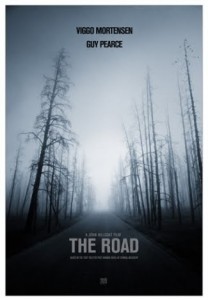 The official trailer for the film The Road scared me more than any horror film released this year. As a fan of Cormac McCarthy’s Pulitzer Prize winning post-apocalyptic novel, the rapid images of Earth’s demise and destruction intercut with a father and son fighting against the evil villains to survive in this new world are a far cry from the bleak yet touching story that brought tears of both joy and sadness to so many readers. (To see what I’m talking about, check out the trailer at: http://www.youtube.com/watch?v=hbLgszfXTAY.) Thankfully, this trailer is just a marketing stunt. For the most part, the film stays close to the novel’s core, recreating the sparse yet hopeful world where the father and son must survive.
The official trailer for the film The Road scared me more than any horror film released this year. As a fan of Cormac McCarthy’s Pulitzer Prize winning post-apocalyptic novel, the rapid images of Earth’s demise and destruction intercut with a father and son fighting against the evil villains to survive in this new world are a far cry from the bleak yet touching story that brought tears of both joy and sadness to so many readers. (To see what I’m talking about, check out the trailer at: http://www.youtube.com/watch?v=hbLgszfXTAY.) Thankfully, this trailer is just a marketing stunt. For the most part, the film stays close to the novel’s core, recreating the sparse yet hopeful world where the father and son must survive.
Although the spectacular moments of violence and explosions would lead you to believe otherwise, The Road is a simple story about the Man (Viggo Mortensen) trying to protect his innocent son (Kodi Smit-McPhee) as they journey east and south towards the ocean. It is unclear what has happened to society, only that humanity is being replaced by a dangerous and corrupt savagery as it struggles to survive. Against all odds, the father tirelessly fights to care for the family’s basic needs: food, clothes, and shelter. However, the Boy refuses to compromise his goodness, constantly putting his concern for others ahead of his own needs for survival. His insistence on “carrying the fire” and “being the good guys” is both a question and representation of hope’s existence for humanity.
A the screen adaptation stayed faithful to the prize-winning book, this underlying meaning of the struggle for hope in the world’s darkest hour appears just as strongly on the silver screen. Unfortunately, the screenwriter and director didn’t trust on the power of their images, instead adding in wordy voice over narration by Mortensen to hammer home the frustrations of living in their dismal world. Although not needed, hearing Mortensen articulate McCarthy’s poetic verses do remind the viewer to question the deeper meaning of the story. The only real failure in the script and movie was how heavily it relied on flashbacks to happier times. If the purpose was to juxtapose the difficulty of continuing life during an apocalypse with the joys of life before, it was totally unnecessary. More likely, the executives wanted to justify the casting of Charlize Theron as the Woman (a part that hardly exists in the book). Or, perhaps they wanted to add some scenes typical to what viewers expect to see in a movie released during Thanksgiving weekend. This may also be why they removed some of the most graphic sequences from the book.
Whatever the case, the acting in The Road is impeccable across the entire cast. Mortensen (The Lord of the Rings trilogy) thrives in these sorts of minimalistic roles that require ruggedness and emotionally guarded yet loving relationships. Newcomer Kodi Smit-McPhee as the Boy is a convincing innocent, making the relationship between father and son especially touching. The supporting cast, especially Robert Duvall and Guy Pearce, expertly round out the cast and bear witness to the decay of civilization.
The washed out images of unspeakable horrors do more than the narration or the acting to propel this story of physical and spiritual survival towards hope. Cinematographer Javier Aguirresarobe (Vicky Cristina Barcelona, New Moon) creates images that capture the desolate world that seems bound to corrupt anyone attempting to survive in it. And yet, the camera allows the most powerful moments of hope. After growing accustomed to this de-saturated world existing almost exclusively of neutral hues of grays, browns, and blacks; every hint of color-whether the blue in a floral pattern or the red of a Coca-Cola can-becomes a powerful representation for a reason for hope.
Ultimately, The Road has succeeded in recreating a slightly-more-optimistic version of Cormac McCarthy’s masterpiece. However, this dark and sparse yet beautiful story of hope will likely gain more critical than financial success, as audiences instead turn to holiday films that reinforce joy through cliché Hollywood happy endings.
-Rachel Imbriglio